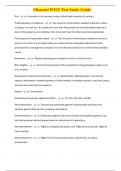Missouri POST Test Study Guide
Tort - -A private or civil wrong or injury, other than a breach of contract.
Preponderance of evidence - -The amount of information needed to decide in favor
of a party in a civil suit. It consists of more than fifty percent of the believable evidence in
favor of the party's suit or defense. One more fact than the other party has established.
Proof beyond a reasonable doubt - -The amount of information needed to convict a
person of a crime. It is enough evidence to eliminate all reasonable objections to the
prosecution's case against a suspect. It is not absolute proof, but it is more than probable
cause.
Summons - -Papers requiring you to appear in civil or criminal court.
Bill of Rights - -First 10 amendments of the constitution that guarantees rights to all
U.S. citizens.
Exceptions to the First Amendment - -Obscenities, fighting words, commercial
speech, defamation: slander (spoken) or libel (written), incendiary speech, and time, place,
and manner restrictions on speech.
Nexus - -Connection
Amendments typically applied to LEO's - -1st, 4th, 5th, 6th, and 8th
4th Amendment - -Citizens are protected against unreasonable searches and
seizures against their person, property, and papers.
5th Amendment - -Protection against self-incrimination and double jeopardy. Can
not hold a person without presentment or indictment of a grand jury.
6th Amendment - -Right to a speedy and public trial. Right to face accuser. Right to
have counsel.
8th Amendment - -Right not to have excessive bail, unjust fines, or unjust
punishment.
, Missouri POST Test Study Guide
14th Amendment - -Establishes primacy of federal government over state
government. U.S. citizen first.
Branches of the Government - -Legislative, Executive, Judicial
Branch of government LEO's a part of - -Executive, but evidence is part of the judicial
Exclusionary Rule - -Any evidence which is obtained illegally must be excluded from
trial.
Booking process - -An administrative process which records pedigree information
and inventory of personal belongings is authorized. This is not subject to Miranda.
Twenty-Four Hour Rule - -Statute that requires a suspect in custody be released after
twenty-four hours if no warrant is issued.
Chain of Custody - -Documenting a seized item's whereabouts from seizure until
introduction into court.
Best Evidence Rule - -States that the original of a piece of documentary evidence
must be entered as evidence, unless the original is lost or destroyed through no fault of the
party offering it.
Exceptions to the Exclusionary Rule - -Impeachment, Independent Source,
Inevitable Discovery, and Good Faith
Miranda v. Arizona - -Supreme Court ruled that all suspects must be read their rights
prior to being questioned. Protects the 5th Amendment.
Miranda equation - -Custody + Interrogation/Guilt-Seeking Questions
Exceptions to Miranda - -Undercover officers and private citizens without LEO
involvement
Custody - -Reasonable belief that you are not free to leave
, Missouri POST Test Study Guide
Miranda Warning Content - -You have the right to remain silent;
Anything you say can and will be held against you in a court of law;
You have the right to talk with an attorney and him/her present while you are questioned;
If you can not afford an attorney, one will be appointed to you;
You can decide at any time to exercise these rights;
Do you understand these rights?
When you should reread Miranda - -Significant passage of time, change in personnel
interrogating, or change in location.
Freedom of Movement - -Contact, Detention, Arrest.
Type of seizure, justification, force used, type of search, and is Miranda issued during a
voluntary contact - -No seizure, mere hunch or suspicion as justification, no force
used, no search administered, and Miranda is not read.
Type of seizure, justification, force used, type of search, and is Miranda issued during a
temporary detention - -Limited seizure of time, reasonable suspicion as justification,
non-deadly force reasonably used, frisk for weapons is permissible, and Miranda generally
isn't read.
Type of seizure, justification, force used, type of search, and is Miranda issued during an
arrest - -Complete seizure, probable cause as justification, reasonable force can be
used, search incident to arrest, and Miranda can be read.
Leaping area search - -Ability to search for evidence or contraband anywhere within
reaching and leaping distance of a person upon arrest.
Criteria that prisoners must be separated by - -Age, sex, and type of offense. Must be
separated by sight and sound.
Search warrant is valid for - -Ten days




